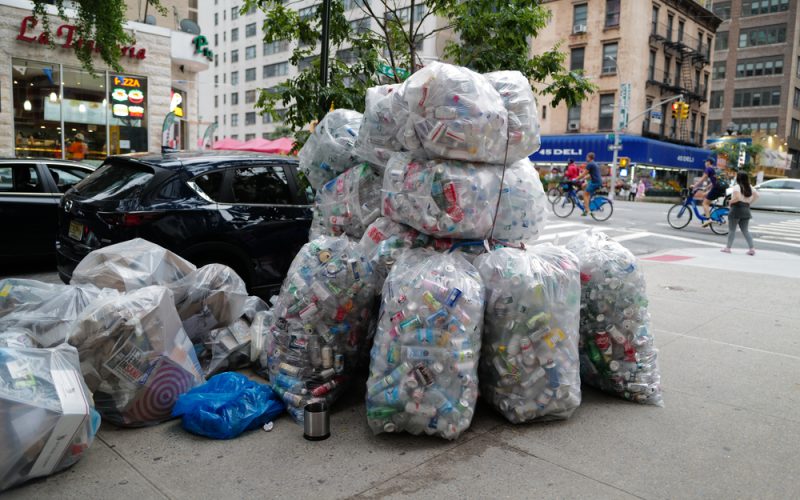New York is suffering from an ever-growing waste crisis. We need a renewed commitment to reduce, recycle, and protect our communities. We got within arms reach during the last legislative session with the expanded Bottle Bill — a crucial update to a law that has served New York for decades and made a huge impact on reducing waste. This session, the bill must pass without delay.
The bigger, better Bottle Bill does more than just reduce waste; it offers lifelines to some of our most vulnerable residents while addressing environmental justice issues in communities disproportionately impacted by waste.
Redeeming bottles and cans is a way to make a living for thousands of New Yorkers. “Canners” are largely from marginalized communities: immigrants, people with disabilities, the elderly, those who have or continue to experience homelessness, and low income folks.
Each day, they navigate New York’s cities, collecting bottles and cans others discard and turning them in at a redemption center for cash. In some cases, this is their only source of income. The hard work of canning provides them a means to survive, but it also serves New York by powering the Bottle Bill — the state’s most effective recycling system.
The expanded Bottle Bill will dramatically improve the recycling outcomes and revalue the work of canners, increasing their earning potential by covering more beverage types — such as tea, cider, coffee, wine, spirits, and sports drinks — and by doubling the deposit to 10 cents per container.
For the canners, who in New York City earn on average $5 an hour, or less than a third of minimum wage, this increase is more than just a number — it’s a life-changing boost in income.
Canners aren’t the only disadvantaged population that stands to benefit from the expanded Bottle Bill. The people that live in the shadows of New York’s 27 landfills desperately need reform to alleviate the high volume of trash flowing into their communities.
Take upstate Seneca Falls, home to the state’s largest landfill, Seneca Meadows, which stands 280 feet tall. Seneca Falls is a state-designated disadvantaged community due to its proximity to the landfill.
Nearby residents have endured years of negative health impacts, including higher-than-average rates of lung cancer in the surrounding county, polluted air, and environmental degradation — all while thousands of tons of trash is trucked in and piled on to the mountain of garbage each day. A huge amount of material that could be easily diverted is largely just dumped.
This waste crisis also underscores a broader issue: our failure to treat waste as a resource. When we landfill valuable materials, we rob our economy of opportunities to reuse and recycle them. Redemption centers are at the heart of this system, but many of these small green businesses are struggling. Without an expansion of the Bottle Bill, they will vanish, ruining livelihoods, disrupting recycling systems, and allowing litter to flood back onto our streets.
Passing the expanded Bottle Bill would be a powerful step toward creating a circular economy, where waste is minimized, and materials are reused and recycled instead of being littered or landfilled in marginalized neighborhoods.
Importantly, the legislation expands the law to a wider variety of containers, including commonly littered drinks like coffee or sports drinks, which will have immense benefits in increasing overall recycling rates in New York and continuing to reduce ugly street litter. This will especially help in the case of glass containers — currently, municipal recycling programs struggle to manage glass — when glass breaks in the single stream recycling process it contaminates the materials and impacts the recyclability.
In states where similar bills have passed, beverage container redemption rates have skyrocketed, and communities have seen notable reductions in litter and landfill waste. New York has an opportunity to build on the success of these programs and finally provide relief to those who are forced to live near the state’s waste, while advancing better environmental and health outcomes for the entire state.
The benefits are clear: a reduction in waste pollution, increased income for the people who rely on canning to make a living, and a reprieve for communities buried under the weight of our trash. By passing the expanded Bottle Bill, lawmakers can uplift New York’s most vulnerable and protect the environment we all share.
New York can’t afford to wait another year to make this change. For the canners, for the communities near landfills, and for a cleaner, more sustainable state, we’re long overdue for an update to New York’s Bottle Bill.
Castalia is executive director of Sure We Can.








